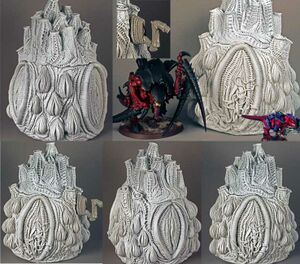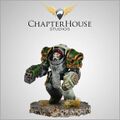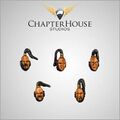ChapterHouse Studios
| ChapterHouse Studios | ||
|---|---|---|
| Website | http://chapterhousestudios.com/ | |
ChapterHouse Studios is a miniatures company that produces miniatures and bits meant to be used with Games Workshop's Warhammer 40,000 and Warhammer Fantasy lines. Rather than dancing around the issue and saying "compatible with major brands of 28mm miniatures (wink, wink)", ChapterHouse's products are directly named and organized by what GW factions and models they're meant to go with.
Lawsuit from Games Workshop

Games Workshop got fed up with this and filed a lawsuit against them when they started making models for units that GW had named in their codexes but not depicted in any art or models, most notably the Tyranids' Mycetic Spore. The lawsuit went on for years, but finally ended mostly in ChapterHouse's favor -- since Games Workshop had never actually produced any depiction of many of the units in question, it was ruled that ChapterHouse (and anyone else) weren't violating any copyrights by making their own models (it would be like Games Workshop trying to bring a lawsuit against every person in the world who made conversions for Warhammer).
However on balance, GW took around 200 specific articles of alleged copyright infringement to court with them, and won about 30% of those. Forcing ChapterHouse to retire many of their own models, as simply making "variations" (such as female versions of existing GW models like Farseers & Aspect Warriors) still counts as infringment. Plus ChapterHouse was ordered to pay damages for these breaches of copyright and pay court costs, which they were still appealing as of early 2014.
In a display of impotent petulance, Games Workshop took out their anger at the ruling on the Tyranids by stripping out the Mycetic Spores as well as the Doom of Mal'antai and the Parasite of Mortrex, which also had models made for them, and if the renaming of the Imperial Guard to the far more copyright-friendly "Astra Militarum", (not to mention the removal of several other ICs and units which never had models from their codex) is any indication, GW's lawyers are still bitter about it (though Games Workshop still love Space Marines too much to rename them, despite the 'Spots the Space Marine' situation). Of course, all of that could have been avoided if they were a little less lazy about giving characters both rules and models, but that would involve too much effort for them.
All in all, this is generally a good example of Intellectual Property Law at work: If you want to earn a profit by using someone else's IP, then you have to either have to License it from the owner (which GW won't give to competitors) or find a way to release original products that the owner has never released or depicted in the any media (that also goes for creating models based on drawings ie: "Derivative Works"). Also, if the owner doesn't want to find someone filling a niche they themselves could be filling, then they shouldn't create gaps in their own product range.
Result
In October 2014 Chapterhouse shut down their website after having their assets frozen by Games Workshop.
On 14 November 2014[[1]] the case was settled between the companies. The appeals from both sides were dismissed "with prejudice" (cannot be re-litigated) in a "Joint Dismissal" (meaning they both agreed to it): The $25,000 damages sought by GW were waived and the asset freeze was lifted. Each side has to pay its own legal fees (Chapterhouse was represented pro bono, of course).
On 18 November 2014 Chapterhouse announced via Facebook that "the web store will be up and going by the end of the week and I will ship out any orders that were not disputed this week as well. Hopefully the site will be able to stay profitable and I am hoping the defense lines will sell as well as some new products as well."
Discussion
Some would argue that Chapterhouse should have seen the lawsuit coming, since they based a huge portion of their business model as "aftermarket bits" specifically for GW products, using GW models/components in their advertising and even using GW names such as "pre-heresy terminator" for their products, which was an incredibly risky venture - akin to playing with fire - especially considering that most people know how litigious GW is over their IP.
The earlier rulings regarding specific instances of infringment still stand, since this was only an agreement on the damages appeal (and not the original case); therefore GW still cannot "own" a copyright on something that they have never depicted or produced themselves, so still don't expect the recent attitude of "no model = no rules" to lessen off any time soon.
Ultimately whether this is bad or good is up to you the reader, since it means that GW from now on will at least have models for the things that they present in their books rather than leaving giant gaps for over a decade (eg: Decapitator).
Some fear that it will now be more difficult to find alternative parts for GW models anymore (meaning you'll have to go to them exclusively for your kit-bashing needs) unless you can find something in another range that fits your chosen model "coincidentally" *wink wink* . In fact even saying it fits with specific third-party products is actually fine (like modified car parts), you still can't advertise your own products using someone else's products and trademarks, the product has to stand on its own, but that's not really any change in IP law at all, so things continue as normal.
Stopping this from happening to YOU
You CAN be sued for creating your own conversions of anyone's models, but so long as they are for non-commercial use, the lawsuit will in practice be thrown out by the judge once it reaches that step of the lawsuit. This is universal tort law; you can be sued by anyone for anything, but unless there are potential damages to award, the suit cannot go anywhere.
If you ARE making money off of your conversion, this leads to questions about the nature of the conversion and the nature of the money, which means the lawsuit will go farther.
Idea-Expression Divide
This was ChapterHouse's defense (when it succeeded): Facts, ideas, and processes are not copyrightable, only specific expressions of facts and ideas. If someone writes down a description of a model, they have a copyright on what they just wrote - NOT on the model described. If you make the model before they do (copyright is about whoever makes it first), you own the copyright to that model. In other words, the model is not actually a conversion - it is your original work.
First Sale
This is what lets retail stores exist. If you buy a thing, you may sell that thing, because it is yours. This is object specific, meaning that if you buy a Land Raider model, you may then sell that specific model - the First Sale doctrine has no bearing on you then producing more models on your own. You may also modify that thing before selling it, of course - for example, you may build and paint the model, *then* sell it, which is why people selling off their old models on e.g. ebay is fundamentally protected. This absolutely means you can buy GW models on an item by item basis, converting them as you go and then selling them off - this is exactly what people do when they, as just mentioned, sell off their armies on ebay.
Fair Use
Turn Signals On A Land Raider was a web comic parodying WH40K, and hence was as quintessential an example of "Fair Use" as exists anywhere - Fair Use is the primary active defense in copyright lawsuits (remember, it's active - if it's coming up, you've been sued and are defending yourself in court with it, so you're playing with fire). TSOALR was threatened by GW with a lawsuit, and it was making money - it had ads on its site - and was using WH40K IP to do so, so the lawsuit would not have been thrown out. Unfortunately, Fair Use has not been rigorously or objectively defined in any jurisdiction on the planet, so it's the judge's call, based on the case at hand and any relevant precedent. TSOALR would still easily have won (parody is a subset of criticism, which is the most heavily enshrined kind of Fair Use), but it would have been expensive to do so, since it would have had to pay a lawyer to raise the defense in court - money TSOALR did not have. If you intend to protect yourself with Fair Use, familiarize yourself beforehand with the relevant cases you're going to claim as precedent and why you think it's fair use, and be prepared to shell out gobs of money to deal with GW shitting all over you. TSOALR folded rather than go to court, and so we lost one of the mainstays of WH40K fandom.
Public Domain
If no one holds the copyright to the model you're converting, no one can claim damages against you in court. There aren't many models in the public domain, but if you do find one, do with it whatever you like - that's the whole point of it.
Not All IP is Copyright
The above defenses work against *copyright* lawsuits; trademark infringement (and patent, but odds are incredibly slim you'll run up against patent law for this) is an entirely different discussion. Trademark infringement is trivial to defend against, if you want to play it really safe, because trademarks apply only to incredibly specific expressions of ideas, like 'Astra Militarum'. If you just don't use those terms, trademark isn't relevant and can't be successfully brought against you. Trademarks are usually where it becomes relevant to get a license from the owning company, because trademarks serve as an indication of the origin of the good or service - to continue with our example, if you sell female Imperial Guard you made yourself, but call them Astra Militarum, customers might get confused about where the models are coming from, and conclude that GW is the original source of the models. If you did this to intentionally mislead them, it would basically be fraud.
There is no surer trademark defense than not using the trademark anywhere, if you want to go into some sort of business based off of someone else's IP. There are other defenses - for example, it is by definition not a trademark violation to simply use a trademarked expression to identify the owner of the trademarked expression, so you can e.g. put out ads saying that your paint schemes are totally better looking than Games Workshop's, and GW's attempt to sue you over your use of their trademarked name will ultimately fail - but trademarks are iffy enough that you should consult a lawyer before doing *anything* with a trademarked expression. You're better off keeping it generic, like: "conversion kits compatible with most 28mm models" or "painting services for tabletop wargaming models".

